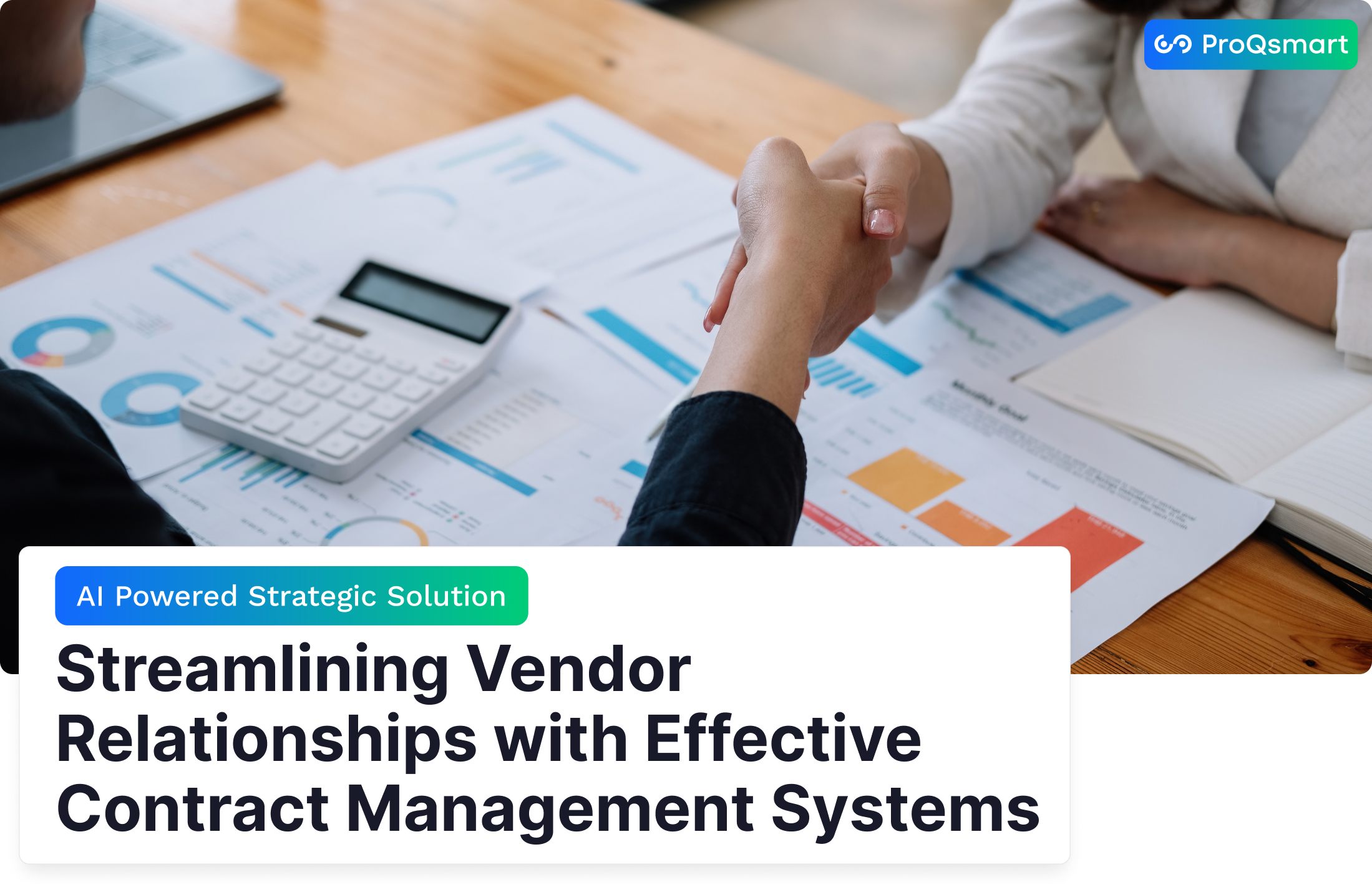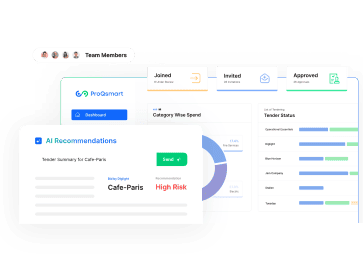Contract management is the process of overseeing, analyzing, and optimizing the entire lifecycle of contracts to ensure compliance, mitigate risks, and achieve business goals. That includes crafting precise statements of work, presenting competitive offers, managing contract performance, and identifying and solving problems that occur in the delivery phase.
With an emphasis on purpose-driven contract management, companies can cut costs, build supplier loyalty, and comply with regulatory obligations. Advanced tools and technologies make it easier than ever to transparently track key milestones. Along with centralizing data, they automate workflows and increase accuracy in contract execution.
For procurement professionals, mastering contract management is critical to navigating increasingly complex supplier networks and driving operational efficiency. In this blog, we’ll dive into actionable strategies and tools to begin transforming your contract management processes.
Why is Contract Management Important?
Contract management plays a pivotal role in safeguarding business revenue and enhancing operational productivity, especially through effective contract management solutions. Poor contract management practices can lead to significant financial losses, as organizations may lose up to 9.2% of annual revenue due to inefficiencies like missed deadlines and compliance failures. This situation underscores the need for a structured approach to the entire contract management process.
Mitigating Risks and Ensuring Compliance
- Poor oversight creates risks like failure to meet deadlines or comply with regulatory standards, resulting in fines, severed supplier relationships, and reputational damage.
- A cohesive Vendor and Contract Lifecycle Management (VCLM) strategy aligns contracts with vendor performance and procurement goals, ensuring compliance and unlocking value throughout the lifecycle.
Operational Efficiency
- Effective contract management significantly reduces administrative burdens on teams, particularly in-house legal counsels who spend up to 60% of their time managing contracts manually.
- Smart tools like contract management software automate workflows, streamline processes such as document storage and compliance tracking, and improve supplier relations.
Contract management software, such as ProQsmart, automates workflows and streamlines the entire contract management process by efficiently storing documents, monitoring performance, and tracking compliance. This transformative contract management software provides AI-driven solutions, including automated workflows and real-time monitoring, enhancing supplier performance evaluation. These contract management software features not only save time but also foster improved supplier relations and increased cost savings.
Challenges in Vendor Relationship Management
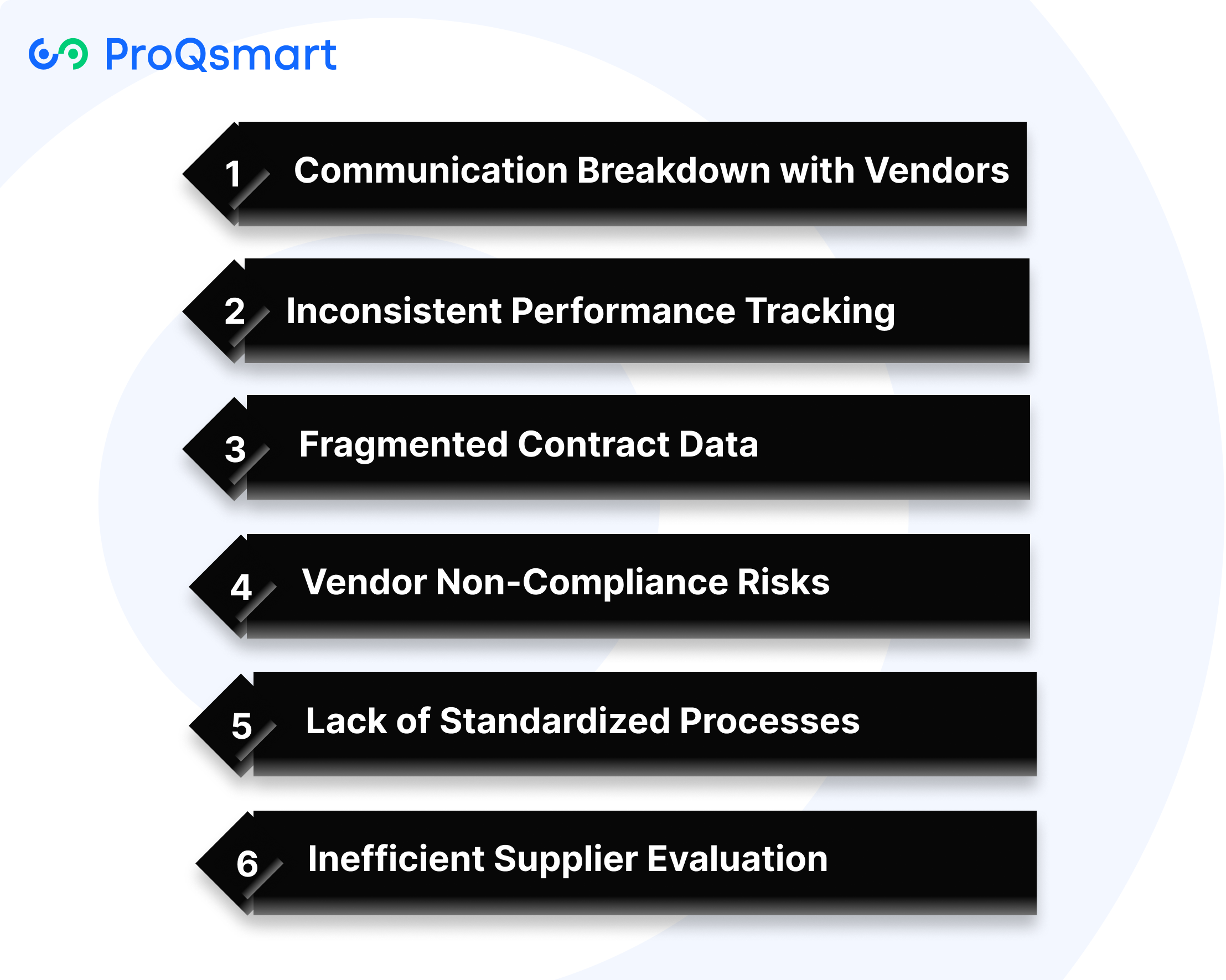
It’s a critical foundation of strong, successful contract management, but complex territory that requires focus and strategy. From cost and timeline overruns to quality control issues, these challenges have the potential to affect construction productivity and return on investment.
Communication Breakdown with Vendors
This miscommunication leads to project scope creep, missed deadlines, unmet client expectations and a souring of the vendor-client relationship. A lack of clarity on scopes of work or failure to provide consistent updates can muddy project timelines or drive up costs.
Fostering transparency with the use of organized lines of communication, like mutually accessible live dashboards, keeps everyone on the same page. Tools, like ProQsmart’s advanced collaboration features, allow all stakeholders to engage with the vendor more easily, preventing confusion and surprise, and building trust.
Inconsistent Performance Tracking
Establishing a sustainable way to track supplier performance over time is a challenge. Without any sort of standardized metrics, the process of evaluating each vendor becomes arbitrary and subjective, creating significant inefficiencies.
Setting up regular supplier performance monitoring systems, such as those provided by ProQsmart, allows for frequent evaluations and data-driven decision making. This helps ensure compliance with specific contract terms and uncover opportunities for optimization.
Fragmented Contract Data
When vendor information is scattered across several platforms, it’s not only inefficient but leads to frustration. A centralized contract management system centralizes data, offering greater visibility and accountability while increasing efficiency with automated workflows.
Integrated with an organization’s contract data, ProQsmart’s AI-driven platform provides procurement teams with the tools they need to monitor and manage contracts effectively while maintaining compliance.
Vendor Non-Compliance Risks
The financial risks of non-compliance are grave, with steep penalties and potential delays to critical path projects. Proactive monitoring, made easier by AI tools such as ProQsmart’s compliance features, mitigates these risks.
This strategy goes beyond compliance to safeguard the broader interests of the organization.
Lack of Standardized Processes
Lack of standardized processes leads to more errors and data inconsistencies. Standardizing the procurement process is essential. Developing templates for contracts encourages consistency.
ProQsmart’s workflow automation enforces standardized workflows, driving consistency and maximizing efficiency across the process.
Inefficient Supplier Evaluation
To scope suppliers down fairly and properly, there needs to be a criteria. ProQsmart’s vendor evaluation tools enhance the contract management process, making it easier to secure better decisions and cost savings every time.
How Contract Management Systems Mitigates the Challenges
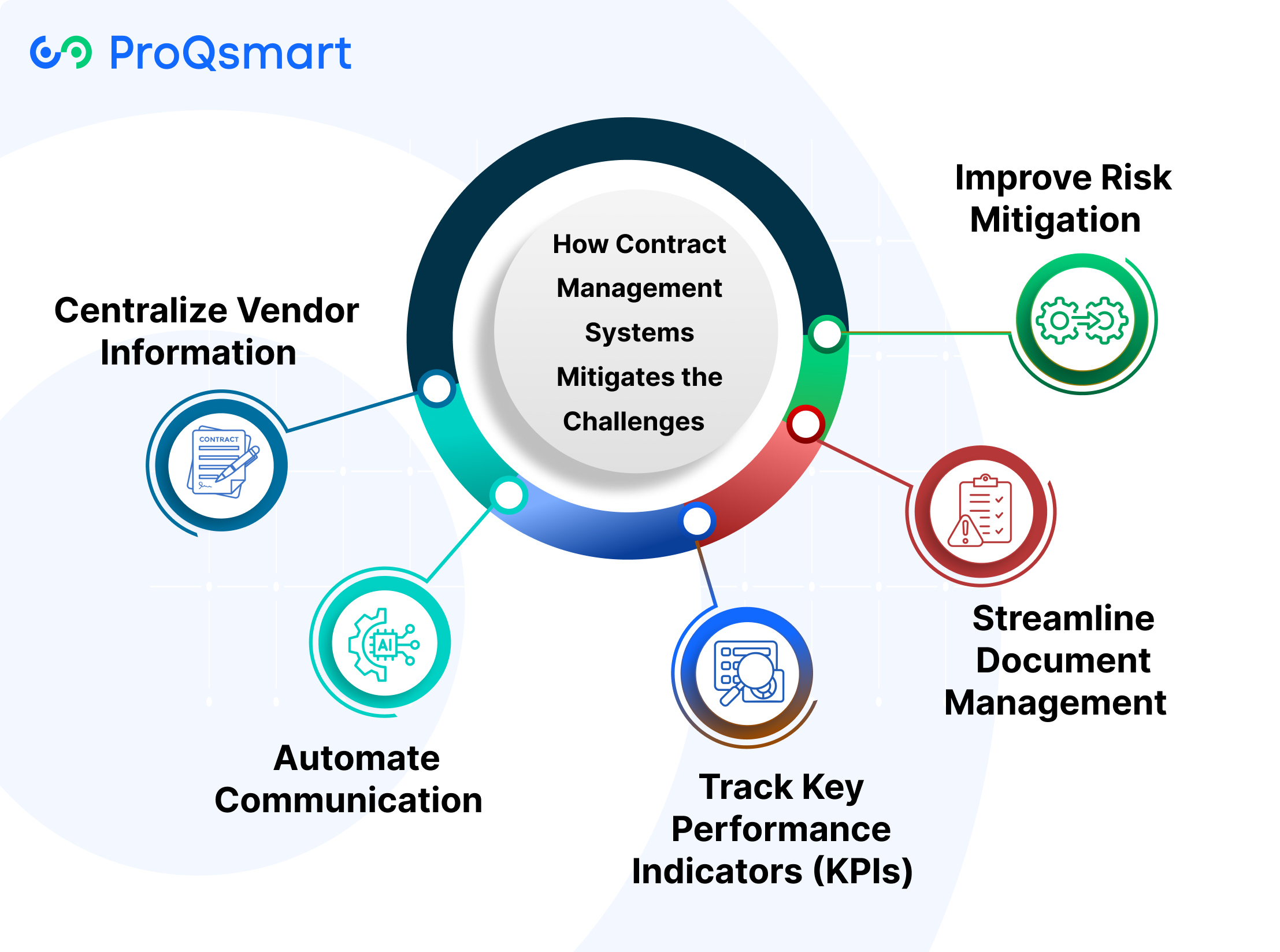
Those with strong contract management tools are worth their weight in gold in tackling some of the top procurement challenges. By centralizing information, automating the contract management process, and improving decision-making, these solutions simplify workflows and protect compliance. The management of every contract forms the basis of ensuring compliance and performance.
1. Centralize Vendor Information
A centralized database simplifies vendor management, offering immediate access to vendor details and contract terms. It also reduces errors through consistent, organized data. Improved collaboration is another benefit, as it ensures all stakeholders view uniform information.
With a CLM such as ProQsmart, every vendor’s performance metrics, agreements, and compliance records are kept in a centralized, searchable, secure repository. This cloud-hosted capability means your team-centric organization is able to access contracts quickly. This avoids unproductive misplacement and enhances overall operational efficiency.
2. Automate Communication
Automation improves communication through features like real-time updates, automated notifications, and reminders. Tools such as Workflow Designer help minimize transactional redlining by dynamically personalizing templates for signers based on transaction type and locality.
By connecting procurement, finance, and legal systems through ProQsmart’s collaboration tools, your entire team can work together. This ensures compliance with increasing regulations.
3. Track Key Performance Indicators (KPIs)
Monitoring KPIs, such as delivery timelines or compliance rates, ensures informed decisions. Tools that come built-in to CLMs help you ensure tracking progress, evaluating vendor reliability, and risk mitigation happen seamlessly.
With ProQsmart’s supplier performance monitoring, you can systematically check quality suppliers against other terms in the contract. This safeguards against costly revenue losses.
4. Streamline Document Management
Straightforward and effective storage and retrieval maximizes workflow continuity. Storing contracts electronically helps organizations comply with confidentiality and privacy regulations.
With ProQsmart’s e-tenderingand subcontractor management features involved, procurement managers can automate document collection and tracking. This encourages full transparency across all procurement processes.
5. Improve Risk Mitigation
Analytics, which are heavily built into CLMs, are great at identifying vulnerabilities and preventing future risks. ProQsmart protects compliance with auditable sourcing data and recovers visibility.
This recovery helps in addressing contract-related revenue losses, often reported as high as 9.2%.
Key Features of Effective Systems
When bringing a contract management software solution on board, it’s important to know what contract management software features to look for in order to maximize procurement contract management processes. These features streamline the entire contract management process with efficiency, security, and collaboration in mind, allowing businesses to get contracts right.
AI-Driven Insights
AI-powered tools are revolutionizing contract management by offering actionable insights into supplier performance trends. AI and NLP interventions parse contract language, extract key terms, and risks early on in the process.
For instance, AI can identify patterns of frequent late shipments from vendors allowing you to take corrective action on poor performers before a crisis situation arises. With ProQsmart’s AI-powered insights, companies can proactively track supplier relationships and compliance issues and make transparent, data-driven decisions, delivering the most optimal strategies.
Automated Workflow Design
Streamlining workflows through automation is necessary to remove redundancies and inefficiencies in the world of contract management. Creating templates in advance of the contract creation process helps streamline time and reduce errors that might occur.
ProQsmart’s workflow automation manages approvals, reminders, and tracking without you lifting a finger. This eliminates many repetitive manual tasks, giving teams back time to spend on more strategic objectives. ProQsmart’s cloud-based architecture makes scalability a non-issue for the system, allowing it to increase efficiency as contract volumes and processes increase in complexity.
Real-Time Collaboration Tools
If it isn’t clear by now, effective communication is critical when it comes to contract management. Real-time tools break down silos and encourage collaboration by allowing everyone to work together in real-time without missing a beat.
With ProQsmart’s ability to allow multiple people to edit documents at the same time, teamwork becomes stronger. Its integration with CRM platforms like Salesforce and Zoho centralizes critical data, giving you a complete and real-time view of customer and contract activities.
Secure Contract Storage
Protecting sensitive proprietary contract data should be a prerequisite, not a negotiable point in contract discussions. A secure storage solution, such as ProQsmart, uses role-based access control (RBAC) to limit access to only those who need to see it.
Features such as an automated audit trail continuously track all activity on every document, bringing unprecedented transparency. These OCR-enhanced search tools make retrieval much simpler, saving hours of valuable time during audits/reviews.
Best Practices for Streamlining Relationships
We know that effective contract management starts with good vendor relationships. Beyond the details, this takes strong communication, consistent relationship evaluations, openness to adopting technology, and planning for the long-term.
By addressing these common practice areas, you and your potential grantees can build smoother workflows, stronger collaborations, and more sustainable success together.
Establish Communication Protocols
Recognizing the importance of communication by clarifying roles and responsibilities beforehand is a solid groundwork of any vendor relationship. By setting clear protocols, businesses can:
-
Assign specific contacts for queries, approvals, and escalations.
-
Define acceptable response times for communication.
-
Maintain detailed records of all interactions.
These four steps go a long way towards avoiding miscommunications that can lead to significant project delays or damage relationships.
For example, bringing together legal and procurement teams under one roof strengthens the legal voice, sets better expectations, and provides greater leverage during negotiations with vendors.
Schedule Regular Performance Reviews
Routine evaluations against specific key performance indicators (KPIs) are absolute necessities. Regular performance reviews, be it quarterly or bi-annually, address any lack of efficiency first while sharing success areas.
Regular evaluations help hold bidders accountable and incentivize vendors to deliver on all terms included in contracts on an ongoing basis. A modern contract lifecycle management (CLM) solution, like ProQsmart, tracks performance and provides insights for improvement, ensuring vendors stay aligned with business goals.
Use Technology for Collaboration
CLM platforms significantly improve stakeholder collaboration by introducing automation and transparency into the process of creating contracts. ProQsmart’s supplier performance monitoring keeps vendors accountable and ensures delivery of obligations, whilst tools such as e-tenders simplify and streamline the bidding process.
Customizable workflows further streamline relationship building to an organization’s unique business goals. Such infusion technology reduces administrative burden so that teams can prioritize high-level, strategic initiatives.
Implement Feedback Mechanisms
Soliciting vendor feedback is key to fostering a positive relationship. Anonymous stay-sober surveys or structured exit interviews will offer you actionable insights.
Analyzing feedback helps address concerns, fostering trust and long-term partnerships.
Proactive Risk Management
Pinpointing risks well in advance is the key to avoiding major disruptions in the contract management process. Keeping vendor compliance in check and utilizing contract management tools like ProQsmart automates workflows, eliminating possible pitfalls.
Emerging Trends in Contract Management
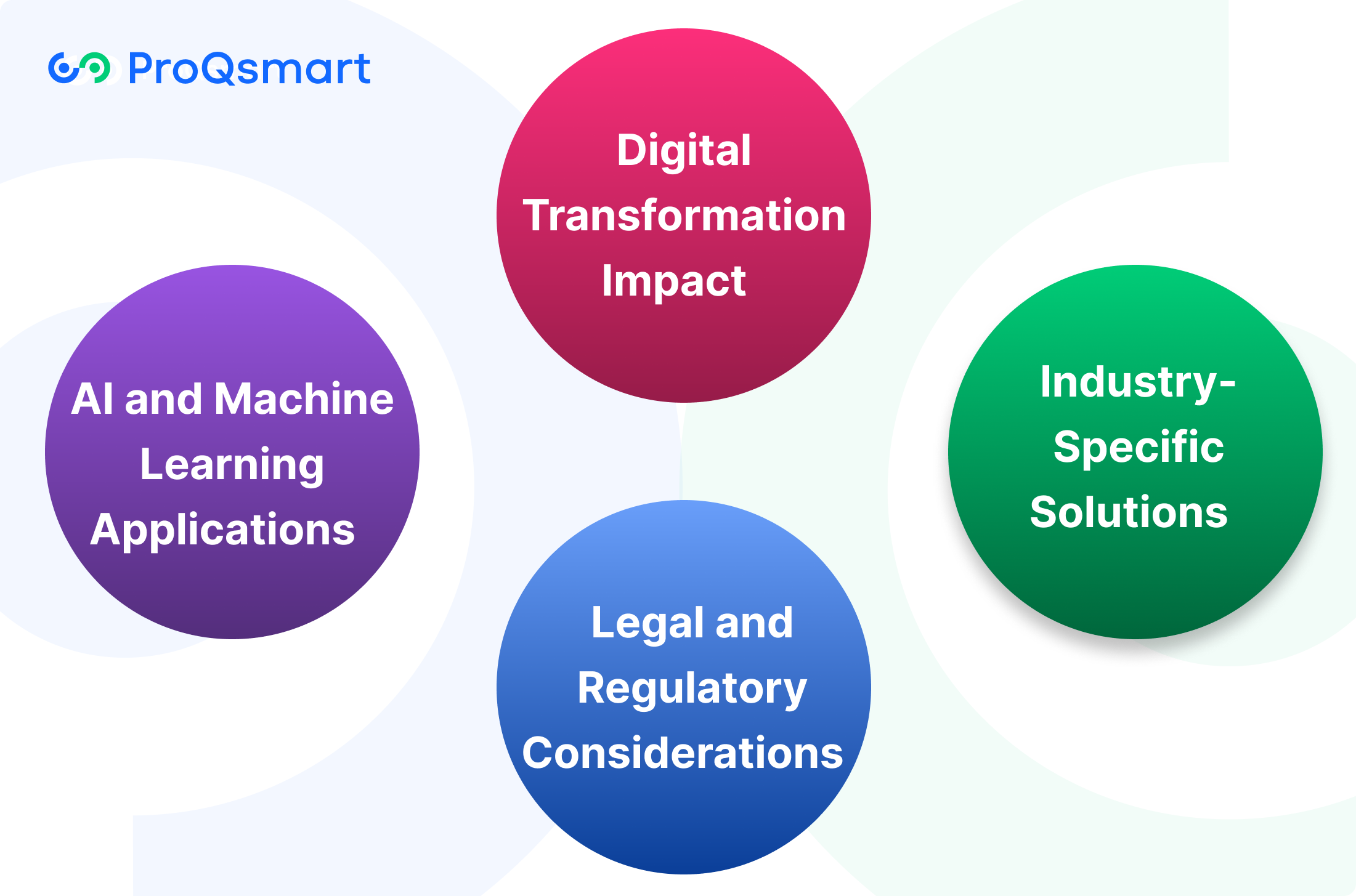
Now more than ever, as businesses face rapidly changing and complex market conditions, efficient contract management has emerged as a fundamental operational imperative. Technology is changing faster than ever, and this technological advancement is already changing the future of contract creation.
Industry-specific requirements and oversight mechanisms heavily influence contracting practices and contract administration.
AI and Machine Learning Applications
Artificial intelligence and machine learning are shaking up the world of contract management by streamlining manual processes and facilitating more informed choices. AI-driven tools, like Natural Language Processing (NLP), are finally advanced enough to start tackling huge piles of contracts.
They are able to flag mistakes and detrimental language with unparalleled accuracy. Companies like IBM are using AI to reduce contract review cycles by as much as 80%. This speeds up deal cycles and minimizes risk in an efficient manner.
Agentic AI further enhances this by using predictive analytics to optimize contract renewals and suggest improvements to templates, ensuring better outcomes aligned with historical data. According to a Deloitte survey, companies that used AI-enhanced risk mitigation tactics saw a stunning 45% decrease in contract conflicts.
This underscores the tangible advantages that this innovative technology can provide.
Digital Transformation Impact
Digital tools have revolutionized contract management, helping you automate workflows and increase productivity. Organizations implementing contract management software experience an impressive 30-40% decrease in processing time.
They further see an administrative cost reduction of 20-30%. For example, a banking center that implemented smart workflows realized a 30% reduction in approval turnaround time, moving deals to close more quickly.
Platforms such as ProQsmart increase productivity by automating processes, maintaining quality control and adherence to standards. They promote team collaboration, keep everything continuously aligned to the budget, and help you manage supplier performance.
Industry-Specific Solutions
Contract management needs are as diverse as the industries that employ them. One of the top five global retail companies also began using tailored contract templates.
This change led to a 40% decrease in mistakes and a 25% increase in satisfaction. ProQsmart offers a variety of fully customizable tools, including subcontractor management integration and bill of quantities smart connectivity.
These capabilities enable companies to truly deliver against their unique and dynamic operational needs.
Legal and Regulatory Considerations
Staying compliant with legal requirements is critical as regulations continue to change. Managing Environmental, Social, and Governance (ESG) compliance is an increasing expectation, requiring contract strategies to support both sustainability initiatives and ESG objectives.
ProQsmart is the future of regulatory compliance with verified, auditable data on all sourcing, protecting your business from compliance exposure.
Conclusion
Effective contract management from the outset lays the groundwork for strong, mutually beneficial vendor relationships. It reduces risks, enhances efficiency, and conserves resources. A well-designed system handles the intricacies of contract management, maintains transparency, and fosters collaboration among teams. By adhering to best practices and leveraging advanced tools, organizations can avoid common pitfalls and ensure seamless operations.
The integration of AI and digital platforms is revolutionizing contract management by enabling real-time tracking, analysis, and iterative improvement. Staying proactive in these trends helps organizations remain competitive in a rapidly evolving market. Key strategies include setting realistic objectives, using robust metrics, and establishing strong communication channels. These steps drive consistent and equitable results.
Explore ProQsmart’s innovative contract management solutions— can elevate your contract management capabilities and drive better outcomes.

